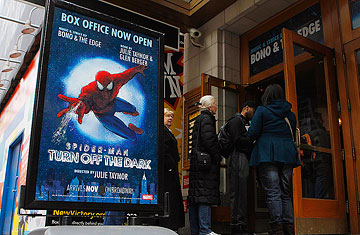
Patrons wait in line at the box office of New York City's Foxwoods Theater, home to the Broadway play Spiderman: Turn Off The Dark, on March 9, 2011
I'm not sure whether, at the end of the long, painful gestation of the Broadway musical Spider-Man: Turn Off the Dark, the product will amount to a viable evening of entertainment. But I know there's a Shakespearean tragedy lurking somewhere in the backstage drama that has resulted in director Julie Taymor being ousted from the troubled show that she had spent the past nine years nurturing.
Officially, she wasn't ousted, of course. According to the press release issued by the show's producers on Wednesday night, she is simply stepping aside from her day-to-day duties so that major revisions can be put in place under the guidance of a new creative team, headed by director Philip William McKinley (The Boy from Oz). Taymor reportedly balked at pressure to make major changes in the production following a slew of bad reviews last month, when the New York City critics grew tired of waiting for the oft-delayed opening (now pushed back again, from March 15 to sometime early summer) and decided to trash the show during previews.
Just who's to blame for Spider-Man's creative implosion? How bad did the backstage squabbles get? What role did Bono and the Edge (who wrote the score and originally recruited Taymor as director) play in the director's downfall? Will Taymor ever work on Broadway again? Those questions remain to be answered. But what I can say unequivocally is that in the bitchy hothouse of New York City theater journalism, the show's troubles quickly escalated beyond all sensible proportion. Yes, four performers were injured during rehearsals and early previews of the technically demanding show. Yes, the show had plenty of creative, as well as technical, problems. When I saw it at a preview in December, the plot was a muddle, the excitement sparse and the ending a total fizzle. But the production also looked terrific, and the flying acrobatics — beyond anything Broadway has yet seen — at times took your breath away.
Was it really one of the worst shows in Broadway history, as both the New York Times and Washington Post critics pronounced? The average critical grade for the show, according to StageGrade, a theatrical website that keeps track of such things, was an abysmal F-plus. Aside from the absurdity of the plus, that is patently ridiculous. F's should be reserved for shows that try nothing and fail even at that. Spider-Man, as often happens on Broadway, was being punished for its ambitions. You want to talk about failed attempts to turn a pop-culture property into a watchable Broadway musical? Let's talk The Addams Family.
Taymor, of course, bears much of the responsibility here. The difference between her great Broadway hit The Lion King and her work on Spider-Man is that back in 1996 she had some savvy theater people looking over her shoulder. The folks at Disney are often derided as cravenly commercial micromanagers, but they at least care, first and foremost, about storytelling. Working with a relatively untested team of producers on Spider-Man, Taymor was apparently given free rein to gussy up a pulpy comic-book story with all sorts of mythic paraphernalia, with no one around assertive enough to warn her that she risked losing the audience along the way.
But Taymor's downfall is also an illustration of a lot of what is wrong with the insular world of Broadway. The show had an uphill battle from the get-go. It was put together by outsiders (Michael Cohl, the lead producer, is a rock impresario) and helmed by a director who, despite her one huge commercial hit, has always seemed more of an art-house snob than a Broadway team player. Worse, it was a musical about superheroes — an outbreak of summer-movie blockbusteritis in the cultivated land of Shakespeare and Sondheim. And while Taymor and others kept insisting that the show be compared, not to traditional musicals, but to stage spectacles like Cirque du Soleil — well, that only prompted fears that the Great White Way was being turned into the Las Vegas Strip.
Taymor's ouster may be good business. The producers clearly see the show as a potential international hit, whatever the New York City critics say, and if they can streamline and simplify it — that is, make it more conventional — they just might have one. But Broadway will likely have lost something in the process.
